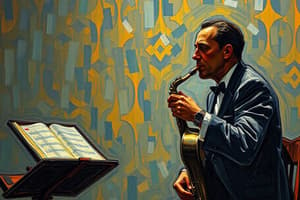Podcast
Questions and Answers
What is jazz?
What is jazz?
Jazz is a music genre that originated around the turn of the twentieth century in the United States, created mainly by African Americans, incorporating elements of both European and African music.
What did the U.S. Congress declare about jazz in 1987?
What did the U.S. Congress declare about jazz in 1987?
- Jazz is only for entertainment.
- Jazz is not important.
- Jazz is a national American treasure. (correct)
- Jazz should be forgotten.
What is jazz interpretation?
What is jazz interpretation?
Changing a melody to a jazz melody.
Define improvisation in the context of jazz.
Define improvisation in the context of jazz.
What does syncopation mean in music?
What does syncopation mean in music?
How does jazz music compare to classical music?
How does jazz music compare to classical music?
What is Ragtime?
What is Ragtime?
What characterizes classic jazz?
What characterizes classic jazz?
Who was Buddy Bolden?
Who was Buddy Bolden?
What distinguishes hot jazz from classic jazz?
What distinguishes hot jazz from classic jazz?
What are speakeasies?
What are speakeasies?
What is Chicago-style jazz known for?
What is Chicago-style jazz known for?
What characterizes swing music?
What characterizes swing music?
What is bebop?
What is bebop?
What is cool jazz?
What is cool jazz?
Flashcards are hidden until you start studying
Study Notes
Definition and Importance of Jazz
- Designated as "America's classical music," jazz is recognized as a rare and valuable national treasure by U.S. Congress since 1987.
- Emphasis on preservation, understanding, and support for jazz culture and heritage.
Origins of Jazz
- Emerged around the turn of the 20th century in the U.S., primarily created by African Americans.
- Combines elements from both European and African musical traditions.
Key Concepts in Jazz
- Jazz Interpretation: The process of transforming a melody into a jazz style.
- Improvisation: The spontaneous creation of music, essential to jazz, informed by the musician's emotions and external musical elements.
- Syncopation: A rhythmic technique that emphasizes unexpected beats, adding liveliness to the music.
Jazz vs. Classical Music
- Both classical and jazz music feature improvisation and utilize established forms and structures.
- Commonality with Baroque music, where composers like Bach were skilled improvisers.
- Notable tonal differences exist between classical music and jazz.
Musical Genres Related to Jazz
- Ragtime: Originating in the late 19th century, it merges march music with African rhythms, known for its "ragged" rhythms.
- Classic Jazz: Characterized by a four-beat rhythm and improvisation aligned with melodies, often associated with New Orleans and Dixieland styles.
- Hot Jazz: Focuses on simultaneous improvisation from multiple musicians, differing from classic jazz's solo-oriented improvisation.
- Chicago-style Jazz: Known for increased improvisation and innovative harmonic elements.
- Swing: Features a strong rhythm section, encourages dancing, and emphasizes a smoother rhythm compared to classic jazz.
- Bebop: Faster rhythms, complex harmonies, frequent chord changes, and is designed for listening rather than dancing.
Notable Figures and Contributions
- Buddy Bolden: Leader of a band that played a mix of blues and folk, noted for songs like "My Bucket's Got a Hole in It."
- Figures like Charlie "Bird" Parker and Dizzy Gillespie are key contributors to the bebop genre.
Cultural Context
- Speakeasies: Illegal establishments selling alcohol during Prohibition, became popular venues for jazz music and contributed to its sometimes viewed as immoral reputation.
Studying That Suits You
Use AI to generate personalized quizzes and flashcards to suit your learning preferences.





